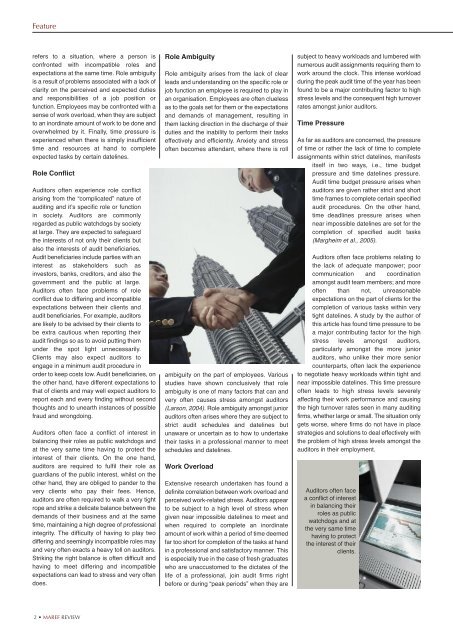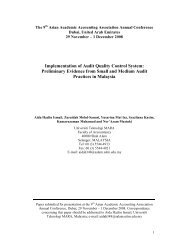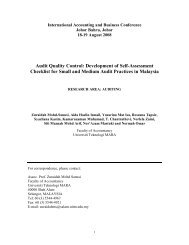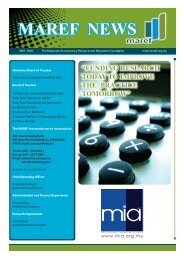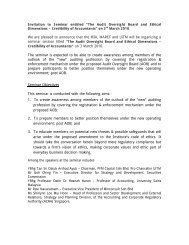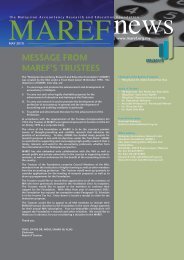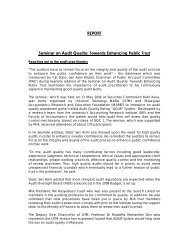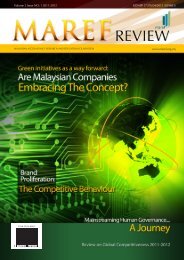www.maref.org.my VOLUME 1 ISSUE NO 2 2010-2011 KDNPP ...
www.maref.org.my VOLUME 1 ISSUE NO 2 2010-2011 KDNPP ...
www.maref.org.my VOLUME 1 ISSUE NO 2 2010-2011 KDNPP ...
Create successful ePaper yourself
Turn your PDF publications into a flip-book with our unique Google optimized e-Paper software.
Featurerefers to a situation, where a person isconfronted with incompatible roles andexpectations at the same time. Role ambiguityis a result of problems associated with a lack ofclarity on the perceived and expected dutiesand responsibilities of a job position orfunction. Employees may be confronted with asense of work overload, when they are subjectto an inordinate amount of work to be done andoverwhelmed by it. Finally, time pressure isexperienced when there is simply insufficienttime and resources at hand to completeexpected tasks by certain datelines.Role ConflictAuditors often experience role conflictarising from the “complicated” nature ofauditing and itʼs specific role or functionin society. Auditors are commonlyregarded as public watchdogs by societyat large. They are expected to safeguardthe interests of not only their clients butalso the interests of audit beneficiaries.Audit beneficiaries include parties with aninterest as stakeholders such asinvestors, banks, creditors, and also thegovernment and the public at large.Auditors often face problems of roleconflict due to differing and incompatibleexpectations between their clients andaudit beneficiaries. For example, auditorsare likely to be advised by their clients tobe extra cautious when reporting theiraudit findings so as to avoid putting themunder the spot light unnecessarily.Clients may also expect auditors toengage in a minimum audit procedure inorder to keep costs low. Audit beneficiaries, onthe other hand, have different expectations tothat of clients and may well expect auditors toreport each and every finding without secondthoughts and to unearth instances of possiblefraud and wrongdoing.Auditors often face a conflict of interest inbalancing their roles as public watchdogs andat the very same time having to protect theinterest of their clients. On the one hand,auditors are required to fulfil their role asguardians of the public interest, whilst on theother hand, they are obliged to pander to thevery clients who pay their fees. Hence,auditors are often required to walk a very tightrope and strike a delicate balance between thedemands of their business and at the sametime, maintaining a high degree of professionalintegrity. The difficulty of having to play twodiffering and seemingly incompatible roles mayand very often exacts a heavy toll on auditors.Striking the right balance is often difficult andhaving to meet differing and incompatibleexpectations can lead to stress and very oftendoes.Role AmbiguityRole ambiguity arises from the lack of clearleads and understanding on the specific role orjob function an employee is required to play inan <strong>org</strong>anisation. Employees are often cluelessas to the goals set for them or the expectationsand demands of management, resulting inthem lacking direction in the discharge of theirduties and the inability to perform their taskseffectively and efficiently. Anxiety and stressoften becomes attendant, where there is rollambiguity on the part of employees. Variousstudies have shown conclusively that roleambiguity is one of many factors that can andvery often causes stress amongst auditors(Larson, 2004). Role ambiguity amongst juniorauditors often arises where they are subject tostrict audit schedules and datelines butunaware or uncertain as to how to undertaketheir tasks in a professional manner to meetschedules and datelines.Work OverloadExtensive research undertaken has found adefinite correlation between work overload andperceived work-related stress. Auditors appearto be subject to a high level of stress whengiven near impossible datelines to meet andwhen required to complete an inordinateamount of work within a period of time deemedfar too short for completion of the tasks at handin a professional and satisfactory manner. Thisis especially true in the case of fresh graduateswho are unaccustomed to the dictates of thelife of a professional, join audit firms rightbefore or during “peak periods” when they aresubject to heavy workloads and lumbered withnumerous audit assignments requiring them towork around the clock. This intense workloadduring the peak audit time of the year has beenfound to be a major contributing factor to highstress levels and the consequent high turnoverrates amongst junior auditors.Time PressureAs far as auditors are concerned, the pressureof time or rather the lack of time to completeassignments within strict datelines, manifestsitself in two ways, i.e., time budgetpressure and time datelines pressure.Audit time budget pressure arises whenauditors are given rather strict and shorttime frames to complete certain specifiedaudit procedures. On the other hand,time deadlines pressure arises whennear impossible datelines are set for thecompletion of specified audit tasks(Margheim et al., 2005).Auditors often face problems relating tothe lack of adequate manpower; poorcommunication and coordinationamongst audit team members; and moreoften than not, unreasonableexpectations on the part of clients for thecompletion of various tasks within verytight datelines. A study by the author ofthis article has found time pressure to bea major contributing factor for the highstress levels amongst auditors,particularly amongst the more juniorauditors, who unlike their more seniorcounterparts, often lack the experienceto negotiate heavy workloads within tight andnear impossible datelines. This time pressureoften leads to high stress levels severelyaffecting their work performance and causingthe high turnover rates seen in many auditingfirms, whether large or small. The situation onlygets worse, where firms do not have in placestrategies and solutions to deal effectively withthe problem of high stress levels amongst theauditors in their employment.Auditors often facea conflict of interestin balancing theirroles as publicwatchdogs and atthe very same timehaving to protectthe interest of theirclients.2 • MAREF REVIEW


